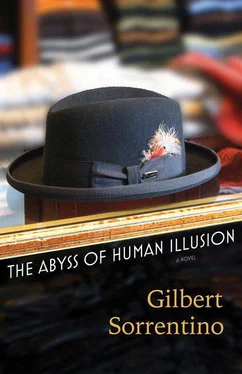When one first met Billy, who was a routing clerk for UPS, it seemed, for some reason, that he “did” something interesting: something artistic, perhaps; or excitingly political — shadowy, vague, radical. He wore a long, well-trimmed beard, round wire-rim glasses, and smoked a lot of marijuana, which he was candid but not too candid about — as if it wasn’t really worth hiding, yet just lawless enough to keep from the unanointed, the squares. To be enlightened as to his smoking habits was to feel — or at least, many people felt themselves to be — intimate adepts. After knowing Billy a little while, however, it became clear that what he “did” was work as a routing clerk for UPS and stay half-stoned at all times. Still, his rickety “mystique” (such were the times) somehow prevailed, amid the smoke and the perfected ravings of the Stones, the Dead, the Airplane, and other assorted multimillionaire rebels. He was a UPS routing clerk, yes, and nothing else, but he was so perfectly hip that it still seemed as if there was something secret and darkly interesting about his life, though it was, metaphorically speaking, a life that possessed the quality of a paper bag.
Audrey was a large, hefty, yet rawboned woman of a startling homeliness: she wasn’t ugly or deformed; her features were regular, as they say, but there was a blank neutrality to her face, a kind of dumb look, and her body, oddly enough, seemed to be dumb as well, if that makes any sense. Those who know Audrey will understand this. She deferred to Billy in all things, and was given to small, consciously half-suppressed smiles when some fringe idea — political, artistic, sexual — was mentioned over the broccoli-rutabaga casserole, as if the mysterious Billy knew all about such things, was involved in such things, had, perhaps, thought up such things. She contributed to Billy’s phantom panache by herself pretending that he “did” something. For all I know, she may well have thought that Billy had a secret, romantic life that he kept from her so as to protect her and their snug domesticity. Where he got the time to lead this life, she would not explore, for when he was not at the UPS job, he was usually at home, cannabis-paralyzed, his ears wide open to the music on their stereo. Rock on, man!
Audrey began attending a macramé class at a nearby community college (Macramé: Fun and Function), and began a small friendship with a woman, some fifteen years her junior, who expressed fascination and delight at the fact that Audrey was a vegetarian, and mentioned, more than once, that she had long considered abandoning meat. Things went along, and Audrey invited her to dinner a few weeks later, at which she and Billy seemed to get along very well. She loved the dinner — eggplant, tomatoes, fresh corn, and yellow squash made into a kind of pedestrian ratatouille, salad, carrot cake — one of Audrey’s specialties — and herb tea. Billy suggested that he “did”—oh, it’s not, he hinted, important — this and that, and Akina, the new friend, was deeply impressed by the reticence of the really interesting Billy. Audrey, of course, helped the scene along, as always: smiles, silences, the works.
They began seeing a lot of Akina, a small, dark woman who wore, more often than not, a strained, worried expression, as if she were about to be interrogated, and whose light-coffee complexion appeared to be — how to put this? — manufactured. Perhaps it was. It was summer now, and when the three went to the beach, Akina, who couldn’t swim, seemed either unaware or uncaring that a profusion of her black pubic hair flourished wildly at either side of her bathing suit’s crotch. This sight may have maddened Billy, for soon he and Akina were committing adultery with, as they say, abandon, and soon Billy moved out, leaving Audrey hurt and bewildered.
Billy left his job at UPS, at Akina’s urging, so that he could “do” all the things that he was capable of; she had realized, of course, that Billy could do nothing at all, but she thought that with his — with his what? — he would make a really great life for them both. Billy had some money, slyly saved in a bank account unknown to Audrey, and they lived off that and the few dollars Akina made working in a boutique on St. Mark’s Place, just then beginning its ascent into the diligently fake disreputability it would soon attain. He ignored Audrey’s pleas for financial help, smoked more “dynamite weed” than ever, and, with Akina’s urging, began to eat meat again: vegetarianism was for dumb fucks — like Audrey! They did a lot of laughing over their lamb chops.
Audrey knew that Billy would tire of Akina, re-embrace his lost, mysteriously vacant life, and return home to her. She suggested that this sort of thing had happened before and that she was, always, to blame for Billy’s sexual escapades, and that they had been mutually planned. She smiled Billy’s secret smile, his I-can’t-talk-about-it smile, and lighted a cigarette made of some sort of rank legume. “Billy,” she said, “well … Billy.” Then she changed the subject; she, and it, obscured in a cloud of smoke that smelled very like a burning barn.
He didn’t understand Los Angeles. It seemed to him a demented collection of buildings scattered haphazardly over a vast area. This lack of understanding was profoundly intensified by the fact that he not only was unable to drive, he had no sense of direction. The old friends from New York with whom he and his restive and discontented wife were staying, took them here and there during their two-week visit, but his pale role as complaisant passenger made the city even more lavishly and bewilderingly strange, for he was never able to locate or isolate or even remember anything that might have served as a landmark, and only knew where he was moments before his host turned into the street where his little cottage stood behind a scrubby lawn that ran directly to the curb with no sidewalk intervening, a commonplace, as he discovered, in California: a place with no sidewalks: pedestrians knew just where they stood.
Perhaps this sense of disconnection, this topographical anomie, contributed to his emotional desuetude, his stunned vacancy, when his wife abruptly left him one sunny, blue Los Angeles day, with a man she had met at a party they’d attended, a man whose name he didn’t know nor face remember: a nonentity, if it came to that. The note she left for him was cheerful, even breezy, as if he had been in on the whole affair and had helped plan it. But he soon realized that he, too, had become a nonentity, now that his wife had left him, that he had “lived,” so to speak, only in relation to her and her curiously blithe selfishness. His host and hostess were enormously kind to him, and took great care not to seem pitying, although this care was in itself a form of pity, as he and they knew. He was, perhaps, made more contemptible to himself as he thought, as he knew, that the man who had stolen — as he had come to think of it — stolen his wife, did not know his name or face either; he could clearly hear his wife’s voice: “Oh, what do you care what his name is? Take me away!” His face burned with the cuckold’s shame.
He spent two week’s after his wife’s departure drinking steadily, one might say stupidly; he drank until he passed out, began drinking again when his brain flickered awake, then drank until he passed out — this went on and on, and half-permitted him to think that he didn’t know what had happened to him: well, he didn’t. After he sobered up, he left Los Angeles, defeated and dulled, to return to New York on a Trailways bus so as to grind himself into his misery a little more, a little deeper; a man of perhaps fifty in the seat next to him performed fellatio on him in the dark early morning somewhere near Joliet, and he absurdly thought that he was getting even with his wife, the bitch. Someone liked him, even if it was this sad old cocksucker.
Читать дальше












